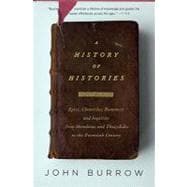
Note: Supplemental materials are not guaranteed with Rental or Used book purchases.
Purchase Benefits
Looking to rent a book? Rent A History of Histories Epics, Chronicles, and Inquiries from Herodotus and Thucydides to the Twentieth Century [ISBN: 9780375727672] for the semester, quarter, and short term or search our site for other textbooks by BURROW, JOHN. Renting a textbook can save you up to 90% from the cost of buying.
| Acknowledgements | p. xi |
| Introduction: A History of Histories? | p. xiii |
| Prologue Keeping Records and Making Accounts: Egypt and Babylon | p. 3 |
| Greece | |
| Herodotus: The Great Invasion and the Historian's Task | p. 13 |
| Thucydides: The Polis-the Use and Abuse of Power | p. 30 |
| The Greeks in Asia | p. 51 |
| Xenophon: The Persian Expedition | p. 51 |
| The Alexander Historians: Arrian and Curtius Rufus | p. 57 |
| Rome | |
| Polybius: Universal History, Pragmatic History and the Rise of Rome | p. 65 |
| Sallust: A City for Sale | p. 80 |
| Livy: From the Foundation of the City | p. 90 |
| Civil War and the Road to Autocracy: Plutarch, Appian and Cassius Dio | p. 111 |
| Tacitus: "Men fit to be slaves" | p. 122 |
| A Provincial Perspective: Josephus on the Jewish Revolt | p. 141 |
| Ammianus Marcellinus: The Last Pagan Historian | p. 149 |
| General Characteristics of Ancient Historiography | p. 158 |
| Christendom | |
| The Bible and History: The People of God | p. 169 |
| Eusebius: The Making of Orthodoxy and the Church Triumphant | p. 178 |
| Gregory of Tours: Kings, Bishops and Others | p. 187 |
| Bede: The English Church and the English People | p. 202 |
| The Revival of Secular History | |
| Annals, Chronicles and History | p. 217 |
| Annals and Chronicles | p. 217 |
| Pseudo-History: Geoffrey of Monmouth | p. 220 |
| Secular History and Chronicle: William of Malmesbury's Modern History and the Scurrilities of Matthew Paris | p. 226 |
| Two Abbey Chronicles: St. Albans and Bury St. Edmunds | p. 235 |
| Crusader History and Chivalric History: Villehardouin and Froissart | p. 244 |
| Villehardouin's The Conquest of Constantinople | p. 244 |
| Froissart: "Matters of great renown" | p. 249 |
| From Civic Chronicle to Humanist History: Villani, Machiavelli and Guicciardini | p. 259 |
| Studying the Past | |
| Antiquarianism, Legal History and the Discovery of Feudalism | p. 283 |
| Clarendon's History of the Rebellion: The Wilfulness of Particular Men | p. 302 |
| Philosophic History | p. 313 |
| Hume: Enthusiasm and Regicide | p. 313 |
| Robertson: "The State of Society" and the Idea of Europe | p. 320 |
| Gibbon: Rome, Barbarism and Civilization | p. 332 |
| Revolutions: England and France | p. 345 |
| Macaulay: The Glorious Revolution | p. 345 |
| Carlyle's French Revolution: History with a Hundred Tongues | p. 354 |
| Michelet and Taine: The People and the Mob | p. 365 |
| History as the Story of Freedom: Constitutional Liberty and Individual Autonomy | p. 380 |
| Stubbs's Constitutional History: From Township to Parliament | p. 380 |
| Modernity's First-born Son: Burckhardt's Renaissance Man | p. 388 |
| A New World: American Experiences | p. 397 |
| The Halls of Montezuma: Díaz, Prescott and the Conquest of New Spain | p. 397 |
| Outposts in the Wilderness: Parkman's History of the Great West | p. 406 |
| Henry Adams: From Republic to Nation | p. 414 |
| A Professional Consensus: The German Influence | p. 425 |
| Professionalization | p. 425 |
| German Historicism: Ranke, God and Machiavelli | p. 428 |
| Not Quite a Copernican Revolution | p. 433 |
| The Twentieth Century | p. 438 |
| Professionalism and the Critique of "Whig History": History as a Science and History as an Art | p. 438 |
| "Structures": Cultural History and the Annales School | p. 448 |
| Marxism: The Last Grand Narrative? | p. 455 |
| Anthropology and History: Languages and Paradigms | p. 462 |
| Suppressed Identities and Global Perspectives: World History and Micro-History | p. 468 |
| Select Bibliography | p. 487 |
| Index | p. 501 |
| Table of Contents provided by Ingram. All Rights Reserved. |
The New copy of this book will include any supplemental materials advertised. Please check the title of the book to determine if it should include any access cards, study guides, lab manuals, CDs, etc.
The Used, Rental and eBook copies of this book are not guaranteed to include any supplemental materials. Typically, only the book itself is included. This is true even if the title states it includes any access cards, study guides, lab manuals, CDs, etc.
Excerpted from A History of Histories: Epics, Chronicles, and Inquiries from Herodotus and Thucydides to the Twentieth Century by John Burrow
All rights reserved by the original copyright owners. Excerpts are provided for display purposes only and may not be reproduced, reprinted or distributed without the written permission of the publisher.